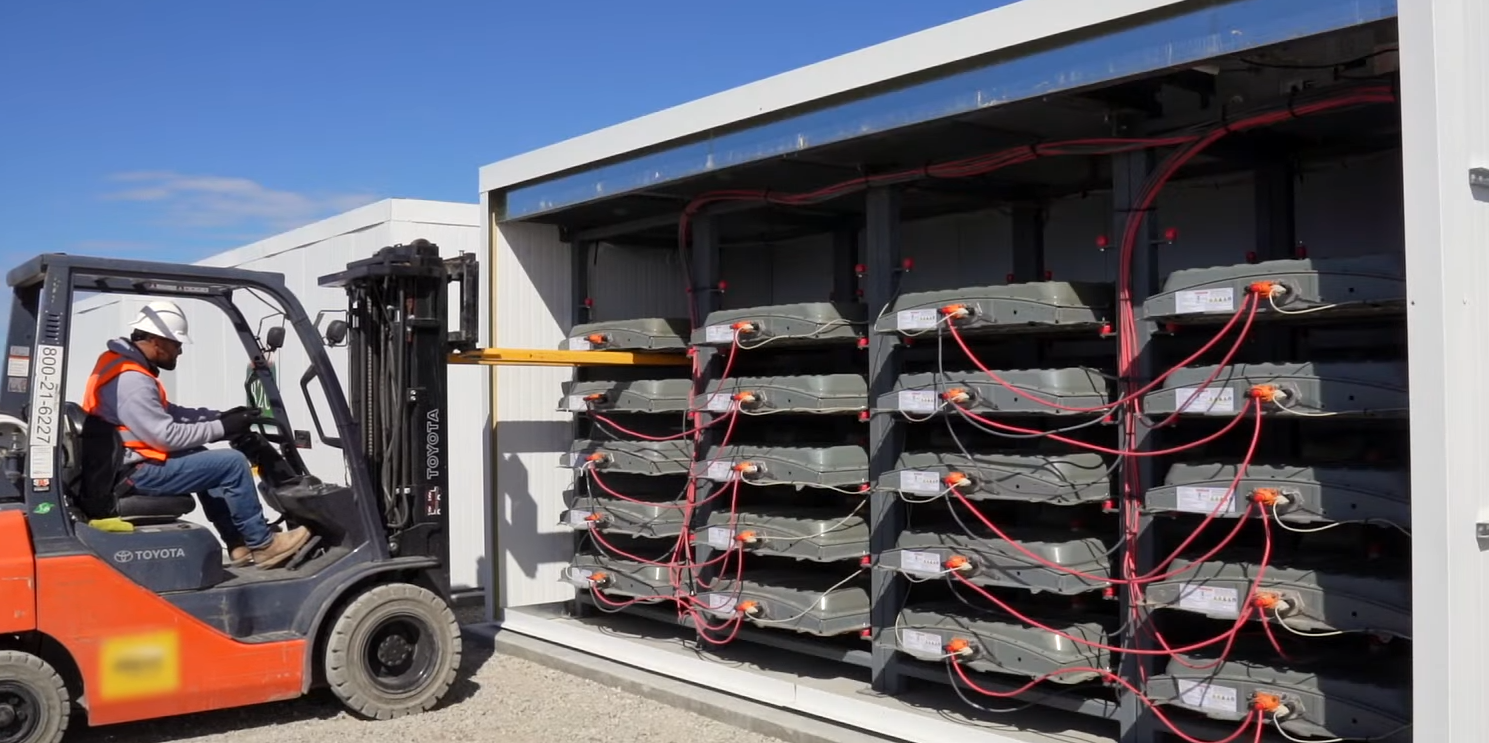I heard someone said that, at the end EV will cost you almost the same as gasoline vehicle, if you have to change the expensive battery every so often. Can someone please give me more info on this? Thank you so much.
You know what you’ll never have to do to an electric vehicle?
Replace a stolen catalytic converter.
Makes me wonder when battery theft will become a thing.
Too heavy, too integrated into the design. Might as well worry about people stealing your transmission or rack & pinion (TFW: that’s what your car uses to translate ‘turning the wheel’ into turning the wheels).
It won’t.
A gas car costs twice as much as a gas car after like 100k miles or so… you end up paying for some random ass shit that broke every couple months. Alternator here, transmission there, radiator, head gasket, O2 sensors, rusted out muffler, injectors… it’s not like your gas motor just keeps on trucking forever and doesn’t nickel and dime the fuck out of you as it ages. An EV is mainly just gonna lose some capacity as it gets elderly, and isn’t likely to have random little repairs as often.
If you ain’t super well off, you roll your shit til the wheels fall off, and with an EV, that’s just going to mean that the Tesla that goes 300 miles on a charge today, in ten years, is gonna be a Tesla that goes 150 miles on a charge, and there’s going to be people that will rock that old ass battery pack for as long as itll keep rocking, and a lot of those packs aren’t actually going to get replaced at the age everyone is claiming they will be.
Battery pack might be the whole ass cost of the car, but poo-pooing EVs over it is disingenuous if you ask me.
that’s just going to mean that the Tesla that goes 300 miles on a charge today, in ten years, is gonna be a Tesla that goes 150 miles on a charge, and there’s going to be people that will rock that old ass battery pack for as long as itll keep rocking
That 150 mile battery pack is still hugely useful with zero refurbishment as a stationary utility power battery. A Tesla model 3 Long Range (330 mile version) is 75kwh. A brand new Tesla Powerwall is 13.5kwh. So that old 150 mile battery is equal to the capacity of 5 and half brand new Tesla Powerwalls.
There’s already a solar power generating company using old Nissan Leaf batteries to store excess generated electricity, then putting that electricity back on the grid at peak times to earn money.

The main counter to that is that EVs are very difficult to repair on your own, so when something breaks, you’re going to be taking it to a specialist shop. While you’re right in saying that ICE components break, let’s not act like electric motors are indestructible pieces of machinery
I have never in my life repaired a car on my own, so that means nothing to me.
Bought an electric car in early 2020. Costs me a few bucks a months to keep charged, tops. I have spent literally 0 dollars on maintenance for it. There are just plain fewer moving parts. It’s a battery, an electric motor, and that’s about it.
So that’s 3.5 years (so far) of paying practically nothing to operate a smooth-driving, quiet vehicle that still gets almost 300 miles per charge and operates primarily off the wind power I buy from my utility company.
I expect to drive this one until it can’t hold a charge anymore, and then I’ll get another one.
How is an EV harder to repair on your own than an ICE? I think you’re wildly underestimating the shade tree tinkerers of the world.
Sure, an EV contains a bunch of proprietary software and configuration, but so do ICE vehicles, and people have been hacking that shit for decades. They’ll swap out the whole ass controller if that’s what it takes :)
But there is sooo little to break on an EV. Mechanically, they are very simple machines. The only repairs we’ve payed for on our 2017 bolt has been a set of tires and wiper blades.
My smaller battery MX Tesla, after 7 years, has gone from 330km to 308km. The degradation is a lot slower than you indicate.
I’m planning on buying a ~ $20k EV and rock it until the battery can’t take me for;m work and back over and I doubt that happens before I sell it to buy a (for realsies) cheap EV truck.
I’ve had an EV as my only vehicle for about 5 years. The biggest cost of maintenance was replacing my tires. Then replacing one of the new tires after I ran over something and put a big hole in one of them.
The regular maintenance on it has been effectively zero. I don’t have any fluids to change (other than windshield wiper fluid) or other regular maintenance tasks other than tire related things. My parents have had an EV for something like 8 or 9 years and their experience has been similar.
Thanks for sharing!
The “it’ll cost you a bazillion dollars to replace your battery” thing is stupid. Most batteries will last as long as the car.
“They found that in a community of 15,000 electric cars only 1.5 percent of batteries have been replaced if you exclude massive recalls […] The team also points out that most battery replacements happen when the car is still covered by a warranty.”
I’m not sure looking at the stats like that is really all that useful.
There are two situations where the battery replacement happens:
- The user forks over the money to replace it personally.
- They manage to convince the manufacturer to cover the cost.
It’s definitely not a given that everyone who wants to replace their battery can and does. This post is about longevity, so presumably most of the time in that situation the person will have to cover the cost of replacement themselves.
I want to be clear, I’m not arguing against EVs. I’m just saying this article doesn’t really have enough information to draw a conclusion.
They manage to convince the manufacturer to cover the cost.
Battery warranties are pretty cut-and-dry, there’s little convincing needed.
If the capacity is below the threshold, it gets replaced
This assumes that it’s within the warranty period (or recall period assuming there is a recall). After that the customer absolutely will be on their own for the repairs assuming they don’t have an aftermarket warranty which a fair number of people don’t bother with.
Eight years/100,000 miles for cars in the US, it’s very generous
Shops are already repairing batteries. All EV batteries are made of thousands of cells, of which individual cells can be swapped by any enterprising individual.
As someone who bought a Tesla because my GTI’s engine died at 95k miles, I’ll take my chances with the electricity
Unrelated to the entire discussion on cars: This is important! What you just did is so so important. I WANT to believe that EVs are great, and they probably are, but the study seems somewhat lackluster. An someone needa to point it out, regardless of their own opinion.
Lol, this is what I want thanks for the link so I can send it to my wife hahahaha ;)
It looks like you can construct scenarios where ICE cars are cheaper than EVs by a fine margin, for instance a mid-sized car that you own for just the wrong amount of time in a country with a high gas subsidy (the United States, for instance) that you don’t drive much. However, for most scenarios, it seems you’ll save 10-15% on the total cost of ownership.
The acronyms TCO (total cost of ownership), ICE (internal combustion engine) and EV (electric vehicle) may help you should you decide to continue research on your own.
Interesting read thank you so much.
I have solar panels at home which generate way more than enough for my home and EV (and still costs less than my old electric bill before solar), so I count charging as free.
People here keep mentioning battery degradation and replacement costs. I got a Kia EV6 and I love it. I tried many other EVs at the time earlier in 2023 when I bought it and the EV6 blew them all out of the water on both features, quality, and (surprisingly) price. And they also have a 10 year warranty for the battery. They mentioned that it would also qualify for free replacement under the warranty based on degradation if it’s past a certain amount. I need to pull out the paperwork and check the criteria.
As far as price comparison to ICE vehicles, I think a fully kitted Mazda CX5 is a good comparison. It’s about 42k with 22-27 mpg, so would cost me around $150/mo in gas. Over 10 years that’s $18k for gas. Compare to the EV6 that I got for around $65k. I’ll definitely save that extra $5k in maintenance costs over 10 years.
Due to the fact that it doesn’t have a bunch of moving parts wearing down constantly like an ICE vehicle would, it’ll probably last longer than 10 years. Most ICE vehicles I’ve owned start to become a real hassle after 7 years. I also appreciate not having to constantly get maintenance too.
Helping reduce pollutants is nice, but that’s a bit of a heated discussion due to what’s required in lithium mining. Even so, it at least feels like I’m trying to do the right thing.
And lastly, EVs are just plain more fun to drive! The linear acceleration is a little weird to adjust to, but it means steady and fast acceleration from standstill since you don’t have to change gears, jolting the passengers just to get up to speed. And I don’t feel like accelerating a bit quickly is financially irresponsible either since I’m not burning extra gas to do it. When I’m in my gas car, I can practically see the dollars burning away.
I’m very curious about your experiences of having problems with ICE cars after 7 years … I’ve never owned a car that’s less than 10 years old, and have rarely had problems with them.
It’s morbidly fascinating reading how rich people see the world …
My last vehicle, a Buick, had the engine crap out around 4 years. Something happened with one of the cylinders, can’t remember what. I had to get it towed to a shop and it cost $2k for them to rebuild the engine. I know a major repair like that early into the life of the vehicle is uncommon, but these sorts of things do happen and you just gamble on it every time you buy a vehicle.
And the warranty didn’t cover it?!
Nope
Wow. Like, I can buy a cheap Chinese motorcycle and it’ll come with 3 years warranty, yet Buick can’t manage 4
It’s because they’re not telling you the whole story. A bad engine not covered by warranty? That means they probably ran it out of oil or something.
Quite possibly, along with another commenter who said ICE cars start to give problems at 70,000 miles.
Literally yesterday I was joking that my British friend’s 2005 Seat Leon is just about broken in since it passed 250,000 miles. Still runs like clockwork apparently.
Fuel pumps, exhaust systems, injectors, tuneups, new radiators, belt replacement are all very common after 7 years. Thankfully less common now, but still occurring on many vehicles are head gaskets, transmissions, motor mounts. None of these issues should effect EVs.
I guess they wouldn’t, but I wouldn’t list most of that as being particularly arduous. I got my current car super cheap because it needed the head gasket, I changed it and it’s yet to have any other real problem.
I guess I don’t see cars as fungible, hell if I’d had my way I’d still be driving my first car which was 35 years old when I got it (and you can now get off-the-shelf electric conversions for them these days)
Uh… have you ever owned a car long enough to need new injectors, radiators, or exhaust systems?
I’ve owned three vehicles that surpassed 400,000 miles, with one approaching 600,000 now. I’ve replaced a radiator once, and it was because of a small boulder tossed by a semi. Belts are usually less than $60, and are only replaced after 120,000 or so. Your average driver won’t have to worry about those but once every 5-10 years. I’ve never had to replace a injector system (and if your dealer tries to sell you a service to ‘flush’ or ‘clean’ the injectors, decline; most auto manufacturers recommend not doing anything but replacing, as the service of cleaning/flushing is more likely to cause damage than actually be beneficial).
Fuel pumps are going to be brand-dependent. Don’t buy ford, because good lord they suck and the pumps do go out, but again, I’ve never had to replace a fuel pump (my three are toyota, honda, and volkswagen).
If you pay for a tuneup, you’re either racing or are a fool. One of those use cases isn’t relevant to a discussion about the average person owning a vehicle.
You are describing statistically anomalies of automotive maintenance.
Almost none of those issues effect an ICE vehicle after 10 years. I’ve only replaced exhaust systems when they’re damaged, and fuel injectors are almost never changed.
I’ve had all of these issues on my vehicles. Sure, some won’t happen, but all can.
Have you had all of them happen on a car less than ten years old?
The statistical maintenance costs for cars just go up over time, with some pretty big bumps generally every 60k miles or so you put on the car. There are just a ton of straight up wear components on ICEVs from spark plugs to belts to fluids, clutches, seals… if you get unlucky, you end up with a good chance of a semi-major repair or maintenance item every year. If you get lucky, then I guess you post about it on the internet.
I’m in Europe, we usually expect ICE cars to last 200,000km at least. My Dad’s Peugeot had over 500,000km on it when he sold it, his 1991 Toyota’s mileage is unknown since the Speedo cable broke over 10 years ago when it had 250,000km on it.
I got my little Clio cheaply because it needed the head gasket, fixing that took me one day and cost under 100€ to fix, and it’s still running smooth 3 years and 50,000km later.
To throw things away just because they need a little repair seems terribly wasteful to me.
Thanks for sharing your experience 🙏☺️
I operated an electric vehicle between 2016 and 2020. All costs included, I paid a bit under 300 EUR per months for 25.000km / year.
I operated different gasoline vehicles between 2007 and 2014. All costs included, I paid a bit under 300 EUR per months for roughly 25.000km/ year.
From that I conclude it doesn’t matter enough to make it a big topic, but at least here in Germany, both electricity and gasoline prices have skyrocketed since, so, who knows. Charging cost may be cheaper if you can charge at home.
Thanks for the info!
I’m driving a Nissan leaf, and it’s costing me about $180 to drive 10,000 miles (4.2ish mi/kwh average over the past year), compared to about that same amount for under 1,000 miles on my Tacoma. I charge 99% at home using a 120v charger and I back calculated using my average mi/kwh and electricity cost. There’s basically no maintenance, so the only extra cost of ownership is basically tires and brakes. My best guess at the battery degradation so far is about 2.5% per year, but the previous owner went extra lengths to keep the battery in good shape, as do I.
So far it looks like every 4-5 years I can replace the battery at the highest estimate and break even compared to my Tacoma. This is the original battery, still at about 80% capacity from 2016 and almost 50,000 miles.
It is hard to calculate. Some batteries will last longer because of didferent designs and environment. Sane with impacts of mining. It gets more complex since each country has different laws about how dispose of waste. That said studies i have read put the green point at aroynd 30 to 40 thousand miles.
Now Toyota’s researches found that plug in hybrids are better right now. Do to lower battey cost, and limited supply of batteries.
When it costs the costs are high. Electric vehicles still have coolant (2 different coolant systems, one for the battery pack and one for the electric motor), a hydraulic braking system and tires that will need to be replaced. But one of the best electric cars on the market was the electric ford focus, and they were really reliable. Except when the coolant system leaked onto the high voltage battery connections. When that happens it fries the battery and requires both battery packs to be replaced. To the tune of something like $20K each (from ford). This cars MSRP was something like $30K. The cost is so exorbitant that there are a few companies that will rebuild the cells rather than replace the battery packs themselves. I don’t know for sure whether that would work in the case of the focus, but even then the Labor involved would still also be expensive.
The lifetime of the car may be how long those battery packs are meant to last. But what happens when they don’t get the same range they had when you bought them? Battery tech gets better every single year. We make new strides in longevity, rechargeability, and sustainability. Each year the cost to manufacture them decreases as the process is further dialled in and streamlined. But the cost of cars continues to go up and tax credits for electric vehicles will probably not be the norm once they reach wide scale adoption.
On top of that, Tesla’s in particular have some significant build quality issues recently.
I brought up the focus because they’re out of factory warranty by now and likely to have at least one costly repair in their lifetime. People here are attesting to their own personal experiences with electric vehicles. But there are people out there who don’t have the same experience.
The problem with coolant leaks in the electric focus is very interesting to me. I’m shocked they would use a conductive fluid if there was any chance it could get into the batteries. Hopefully they changed the design to prevent this situation in the future.
Most coolant for vehicles is half water. It’s a 50/50 mix. My bet is that they never thought it would leak. I can ask but I’m not sure as far as design goes. I know they don’t make an electric focus anymore. But any type of liquid with the right amount of electrolytes in it can cause corrosion on metal wiring.
Makes sense, water kicks ass at heat transfer so I get why they’d use it. Thanks for the info.
Good point here, thanks for sharing
Still way cheaper even if you replace the battery when recommended (7 years ish)
Add in the minimal to zero auto maintenance and your EV just keeps getting cheaper every time Tucker’s bronco needs an oil change and filter.
Last time I took my EV in for service the guy just told me to come back in 6 months. Truly hilarious.
No spark plugs, oil changes, no transmission fluid, nothing to leak. No air filter or fuel filter or vacuum hoses or plug wires or whatever they are going to try and sell you.
Plus, fewer brake jobs because of regenerative braking.
I miss a manual transmission but I don’t think I’ll ever go back to gas.
My dream would be an 80s M3 with an electric engine swap. There are electric motors you can just bolt in front of the transmission as a direct replacement for a gasoline engine. I’ve heard most people just put the transmission in 3rd gear and leave it there, but I bet it would be crazy fun to take off from green lights in 2nd and go through the gears while accelerating. Having the best of both worlds imo
Exactly. The sheer convenience of owning an electric vehicle vs a rattle-trap changed the game for me.
Better question is will you be able to sell your used 10yo EV.
I think that’s the main question. How used electric cars lose value?
I mean, I’m pretty ok in buying a 5-10yo ICE car, but I’m not sure if I’d do the same with an electric one
Perspective from India:
28% GST for spare parts of electric vehicles and the companies play monopoly by raising the price of the spare parts by 5x to 10x.
If we don’t use original parts sold by them and do maintenance outside the vehicle will not be covered under warranty.
There were many fire accidents due to the hot climate, which requires the warranty in place.
It’s kind of a nightmare to own an electric vehicle in India.
It’s good for someone who drives for more than 50km in a day. They can save on fuel, which will be higher than all other costs. The fossil fuel is 10x higher covering the same distance in an electric vehicle.
Every time I am tempted to buy a Hyryder, this is what comes to my mind. I drive at most 50 kms/week. We are probably some years away from this becming an economic reality.
That’s good to know, thank you so much.
“Maintenance” for your battery isn’t something that costs you every month. Nobody is going to open the thing and fiddle with it and turn screws etc.
It all consists of 1. how you are using it and 2. how good is your battery controller, hardware and software.
I have seen an old guy on TV who was driving his Tesla daily as a salesman, and he reported about several hundred thousand miles on his first battery and then twice as much on his second. He said he does never ever charge it above 80% and never discharge below 20%.
One thing to note is that car infrastructure maintenance (e.g. upkeeping roads and bridges) is often paid for in substantial part through a gas tax. Electric cars don’t pay the gas tax, so they are essentially freeloading. In the future, this may change, but this is one reason why EVs are currently cheaper than ICEs.
My state hits you with a tax you can pay per mile or once a year with registration, and was fairly expensive, so not really true here.
That sounds sensible. Car use is heavily subsidized, so someone is paying for those miles. It makes sense that a greater proportion of that cost falls on the driver.
I pay for that infrastructure when I register my car. As in, I pay easy more than an ICE car does. Way more. There is no freeloading going on. It is just a propaganda point used by oil interests to discourage people from adopting evs. The freeloaders you are looking for are the corporate interests who are using my lungs to clear the poisons they are spilling into the air with their diesel engines. Those are the freeloaders you are looking for. Protip: you can spot the freeloaders in a crowd real easy. They are the ones pointing their fingers and yelling “freeloaders”. Projection is a powerful tool
Oh please, your modest increase in registration fees do not cover all the externalities of cars. Cars still enjoy TONS of subsidies, including free parking, free highways, etc. In fact, 60% of the surface areas of most cities in NA are devoted to cars.
It’s hilarious that you think you’re fighting “Big Corporate Lobbying” by defending EVs. I don’t know where you get that I’m in favor of ICEs. I am against car dependence entirely. You’re being brainwashed into thinking environmentalism is just about buying another expensive product instead of fighting the car lobby entirely.
I don’t have the answer to your question, but one important thing to also consider is the cost/savings to the environment of gasoline vs EV. To me, that’s worth a lot.
then again they both still just spray microplastics











